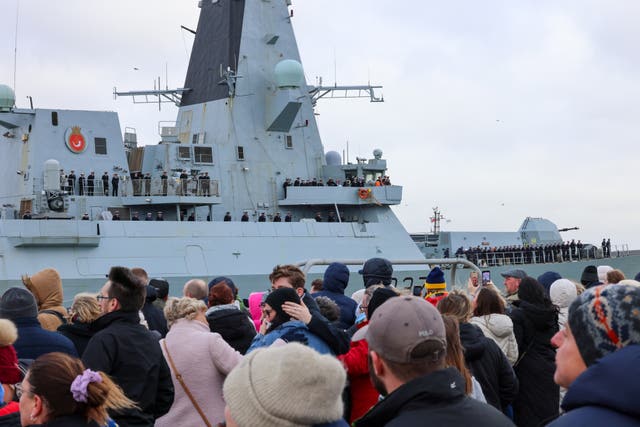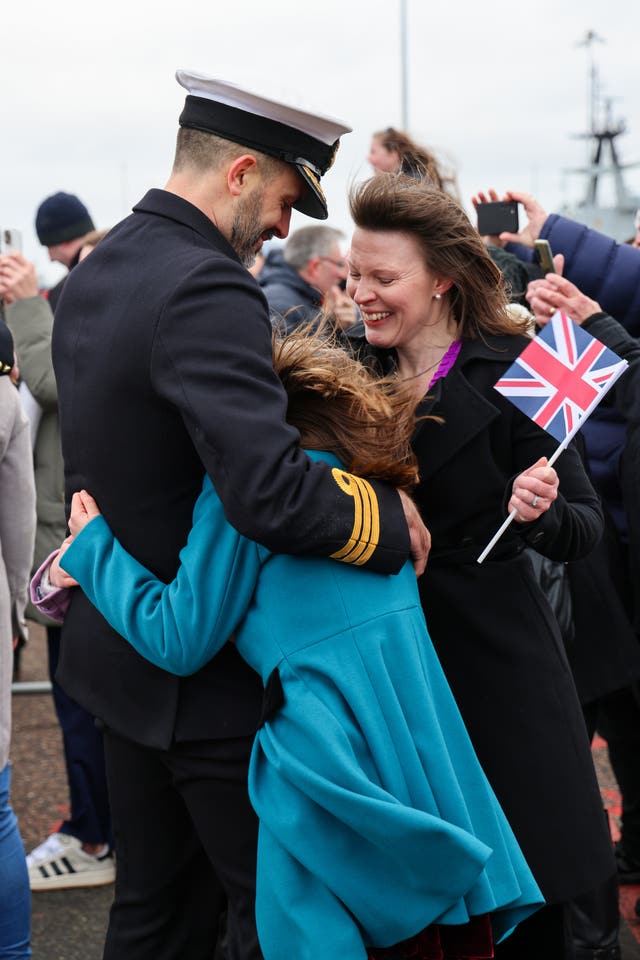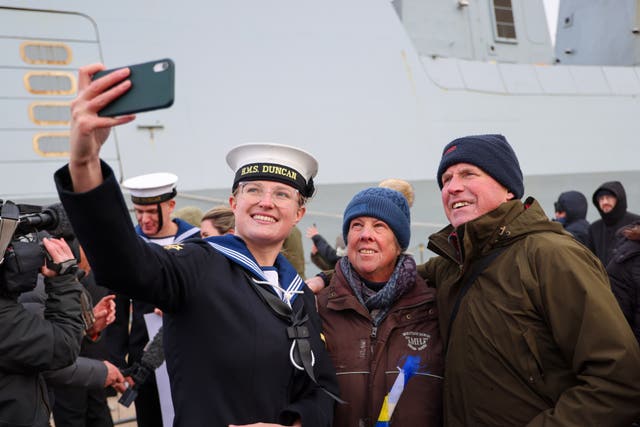Sailors on Royal Navy destroyer home for Christmas after six-month mission
HMS Duncan was deployed to the Red Sea amid Houthi rebel attacks but was ordered to stay in the Mediterranean as conflict escalated.

Sailors on a Royal Navy destroyer have been reunited with their loved ones for Christmas after a mission lasting more than six months in the eastern Mediterranean.
HMS Duncan sailed to replace HMS Diamond in the Red Sea in multinational efforts to keep trade flowing during attacks by Yemen’s Houthi rebels.
But the wars between Israel and Hamas, and Israel and Hezbollah, escalated regional tensions and HMS Duncan was ordered to stay in the eastern Mediterranean.

Footage of its homecoming shows a crowd of people facing blustery weather at Portsmouth harbour, some waving welcome signs and Union flags.
Uniformed crew members stood in line on the ship’s deck as it neared, before running down the ramp to hug their loved ones after it had docked.
The Royal Navy said 1,000 people greeted the 200 sailors that had been aboard HMS Duncan.
After describing HMS Duncan’s activities in the Mediterranean, he said: “For us, it’s a bit of time off, a bit of time back home with families – back in the new year in order to start all over again, basically.”
Leading Hand Andrew Lynch, a member of HMS Duncan’s logistics team, said he will “carry a piece of this experience” aboard the ship with him when he returns home.
He said: “I look around. The faces of the people who have become my new family. The laughter that fills the mess, the shared struggles that have bound us together in this challenging world.
“The friendships forged not by proximity, but by necessity and resilience. When I return home, when I’m finally reunited with the faces I’ve missed so terribly, I will carry a piece of this experience with me.

“When I hold my loved ones again, I’ll do it with a new kind of appreciation, a deeper love, and a quiet resolve that no distance, no time, no separation can ever truly break.”
A destroyer is a fast-moving vessel and the Royal Navy said HMS Duncan acted as an escort to the task group from the USS Wasp.
The Portsmouth-based ship used its powerful radars and Sea Viper missile system to escort the US navy’s amphibious assault ship, it added.
It said HMS Duncan also spent six months of 2023 in the eastern Mediterranean, leading Nato’s premier security mission in the region.
Engineering technician Bradley Jones said: “Having endured another long deployment onboard HMS Duncan, I can say without hesitation that I have developed a deep gratitude for the friends and family I have back home.
“No words can give justice to what it’s like being deployed. I went through periods of self-doubt, frustration and fear, but these emotions were often followed with love, laughter, and hope. Hope for a better tomorrow.
“Hope for the day to be reunited with loved ones and hope that our efforts whilst deployed have helped to secure a safer world.”
In honour of the Mediterranean operations, the HMS Duncan was recently awarded the Destroyer Trophy for the second year running at the Fleet Efficiency Awards, the Royal Navy said.

“Despite a significantly compressed regeneration period following last year’s deployment, they stepped up at every opportunity, displaying remarkable dedication, professionalism and an unwavering sense of duty in often dangerous situations.
“As we return home in time for Christmas, with my team selected as the best destroyer in the fleet, they should be rightly proud of everything they’ve done.”
The ship sailed more than 36,000 nautical miles and operated with 21 allied warships.
Its flight deck had 400 landings including 20 by US, French and German aircraft, while its Wildcat helicopter sortied 89 times.





